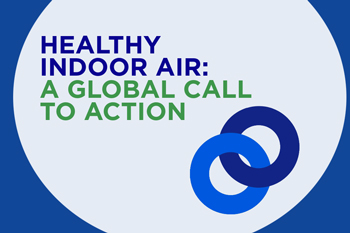Australia to lead first-ever United Nations indoor air quality global pledge

Australia to lead first-ever United Nations indoor air quality global pledge

The Australian Academy of Science and Burnet Institute are leading global efforts at the United Nations, to declare healthy indoor air a human right.
More than 300 leaders will come together to make history at the high-level event taking place on the sidelines of the 80th UN General Assembly on 24 September (AEST).
The UN event is being co-sponsored by France and Montenegro. Brown University’s School of Public Health and the OSLUV Project are joint co-convenors alongside the Academy and Burnet Institute.
The global pledge, already signed by over 150 organisations, is the first international effort to formally recognise clean indoor air as essential to health and well-being.
Chief Executive of the Australian Academy of Science, Anna-Maria Arabia OAM, said the Academy is proud to be collaborating with global leaders at the UN to galvanise global action to improve indoor air quality.
“The science of indoor air quality is well understood and the solutions to address poor air quality are available. Political leadership is required to prioritise action that will make every workplace safer and healthier, and that will better prepare Australians when bushfires and pandemics impact our country,” Ms Arabia said.
This effort builds on the Academy’s sustained advocacy to reduce the negative impacts of airborne transmission of viruses and pollutants in indoor spaces.
Most recently, the Academy’s submission to the Productivity Commission’s review recommends establishing indoor air quality standards, underpinned by guidelines aligned with World Health Organization recommendations.
Such measures can improve overall health, reduce absenteeism and improve performance in childcare settings, schools, hospitals, aged care settings, and all workplaces.
“If you don’t measure it, you can’t fix it. The collective cost of inaction in loss of health and productivity is in the billions in Australia alone,” said Ms Arabia.
The Australian delegation to the UN event includes Academy Fellow Professor Lidia Morawska FAA, Director, Thrive - Queensland University of Technology, and Professor Bronwyn King AO, Special Advisor – Clean Air at Burnet Institute, who conceived the idea for the UN side event.
Professor Morawska recently questioned why Australian schools have lower standards for air quality monitoring, ventilation and filtration than many greenhouses and pet shelters.
“Indoor air quality is a glaring gap in Australia’s approach to public health. A nationally coordinated process of reform is required to ensure all Australians receive the benefits of cleaner indoor air,” Professor Morawska said.
Professor King said Australians spend 90% of their time indoors, yet schools, hospitals, workplaces and transport are not guaranteed to have clean, healthy air.
“In fact, indoor air is commonly found to be of poor quality, containing many hazards detrimental to health. The good news is that practical solutions already exist. Uplifting indoor air quality offers an extraordinary opportunity to improve health for all,” Professor King said.
“This event will mark the first time the global indoor air community has convened at the United Nations, the rightful platform for such a crucial global issue that, if addressed, offers an extraordinary opportunity to improve health for all. Attention to indoor air quality is a gap in our public health frameworks. We need to close that gap.”
The UN event will be livestreamed via UN Web TV from 3:30pm EDT 23 September/ 5:30am AEST 24 September.
Partnering organisations
